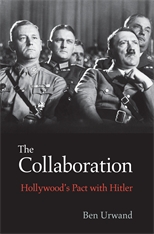Still More to Learn about Corporations’ Complicity with the Third Reich
July 3 Update: Owing to the NY Times article I cited on first publication of this post, Publishers Weekly reports today that Harvard University Press has moved up by two weeks the release date of The Collaboration: Hollywood’s Pact with Hitler. I’m pleased to see so much early momentum gathering for this important book.
—
In 2000, while an editor at Crown Publishing, I acquired a book that later became an international sensation and a bestseller in the US. It was IBM and the Holocaust: The Strategic Alliance Between Nazi Germany and America’s Most Powerful Corporation by Edwin Black. I believed it was imperative that the book be published because it documented hitherto unknown revelations such as the fact that IBM’s punch card tabulation system was licensed to the Third Reich which then used the technology to catalog and keep track of Jews and others under its rule they deemed undesirables. Turned out that corporate complicity with Hitler was as American as cherry pie.
In the years since Black’s book was published, I’ve seen a lot of other histories of the Third Reich, but few have struck me as packing the same historical punch as the book on IBM. Until today, that is. Reading the NY Times on the web, I saw this headline, “Scholar Asserts That Hollywood Avidly Aided Nazis,” tipping an article about a forthcoming book, The Collaboration: Hollywood’s Pact with Hitler, by Ben Urwand, a 35-year old historian from Australia. The story by Jennifer Schuessler reports Urwand has found copious documentation showing how very willing Hollywood executives were to make their movies in ways that would please Nazi officials, including Hitler himself. Some of these execs were Jewish, but they cooperated anyway. The Times reports that in Urwand’s book,
 “On page after page, he shows studio bosses, many of them Jewish immigrants, cutting films scene by scene to suit Nazi officials; producing material that could be seamlessly repurposed in Nazi propaganda films; and, according to one document, helping to finance the manufacture of German armaments.”
“On page after page, he shows studio bosses, many of them Jewish immigrants, cutting films scene by scene to suit Nazi officials; producing material that could be seamlessly repurposed in Nazi propaganda films; and, according to one document, helping to finance the manufacture of German armaments.”
Urwand also found that Jack Warner, of Warner Bros., personally ordered that the word ‘Jew’ be removed from all dialogue in the 1937 film ‘The Life of Emile Zola,’ which focused on Zola’s defense of the persecuted Jewish soldier, Alfred Dreyfus. Mr. Urwand writes that Warner Bros. was the first studio to invite Nazi officials to its Los Angeles headquarters to screen films and suggest cuts. . . . ‘There’s a whole myth that Warner Brothers were crusaders against fascism,’ Mr. Urwand said. ‘But they were the first to try to appease the Nazis in 1933.’”
The cooperation, or as the author insists, collaboration, continued until well after Kristallnacht in November 1938. He found evidence that in December 1938, MGM was financing German armament production as part of a deal to circumvent restrictions on repatriating movie profits, according to the Times, which adds, “Urwand said that he found nearly 20 films intended for American audiences that German officials significantly altered or squelched. Perhaps more important, he added, Jewish characters were all but eliminated from Hollywood movies.”
I’m eager to read Urwand’s book when it comes out in October from Harvard University Press, and in the meantime I recommend you read Schuessler’s story. There’s also been early coverage of Urwand’s book in Tablet magazine in an article by David Mikics. And here’s video of Urwand talking about his book:
